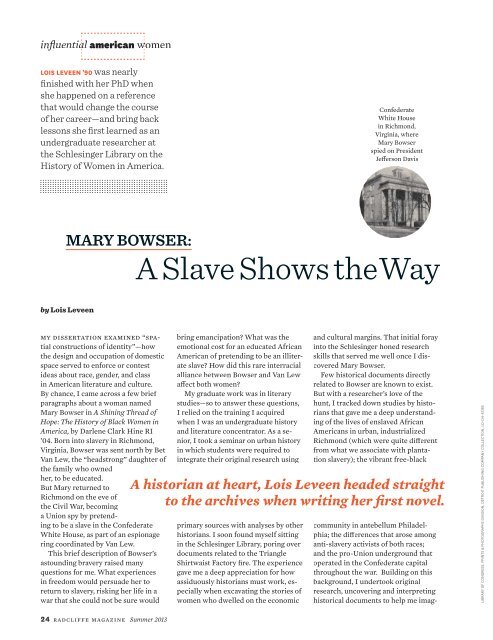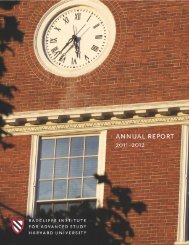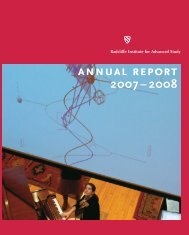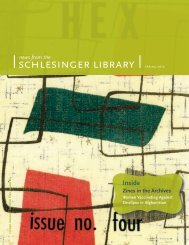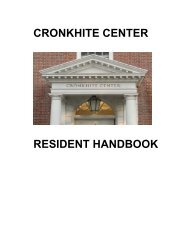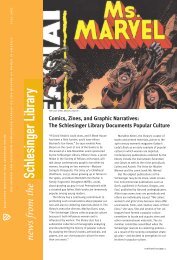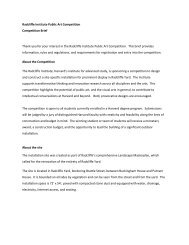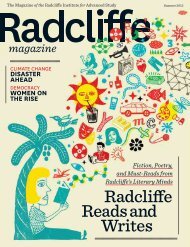Download - Radcliffe Institute for Advanced Study - Harvard University
Download - Radcliffe Institute for Advanced Study - Harvard University
Download - Radcliffe Institute for Advanced Study - Harvard University
Create successful ePaper yourself
Turn your PDF publications into a flip-book with our unique Google optimized e-Paper software.
community in antebellum Philadelphia;<br />
the differences that arose among<br />
anti-slavery activists of both races;<br />
and the pro-Union underground that<br />
operated in the Confederate capital<br />
throughout the war. Building on this<br />
background, I undertook original<br />
research, uncovering and interpreting<br />
historical documents to help me imaginfluential<br />
american women<br />
LOIS LEVEEN ’90 was nearly<br />
finished with her PhD when<br />
she happened on a reference<br />
that would change the course<br />
of her career—and bring back<br />
lessons she first learned as an<br />
undergraduate researcher at<br />
the Schlesinger Library on the<br />
History of Women in America.<br />
Confederate<br />
White House<br />
in Richmond,<br />
Virginia, where<br />
Mary Bowser<br />
spied on President<br />
Jefferson Davis<br />
MARY BOWSER:<br />
A Slave Shows the Way<br />
by Lois Leveen<br />
My dissertation examined “spatial<br />
constructions of identity”—how<br />
the design and occupation of domestic<br />
space served to en<strong>for</strong>ce or contest<br />
ideas about race, gender, and class<br />
in American literature and culture.<br />
By chance, I came across a few brief<br />
paragraphs about a woman named<br />
Mary Bowser in A Shining Thread of<br />
Hope: The History of Black Women in<br />
America, by Darlene Clark Hine RI<br />
’04. Born into slavery in Richmond,<br />
Virginia, Bowser was sent north by Bet<br />
Van Lew, the “headstrong” daughter of<br />
the family who owned<br />
her, to be educated.<br />
But Mary returned to<br />
Richmond on the eve of<br />
the Civil War, becoming<br />
a Union spy by pretending<br />
to be a slave in the Confederate<br />
White House, as part of an espionage<br />
ring coordinated by Van Lew.<br />
This brief description of Bowser’s<br />
astounding bravery raised many<br />
questions <strong>for</strong> me. What experiences<br />
in freedom would persuade her to<br />
return to slavery, risking her life in a<br />
war that she could not be sure would<br />
bring emancipation What was the<br />
emotional cost <strong>for</strong> an educated African<br />
American of pretending to be an illiterate<br />
slave How did this rare interracial<br />
alliance between Bowser and Van Lew<br />
affect both women<br />
My graduate work was in literary<br />
studies—so to answer these questions,<br />
I relied on the training I acquired<br />
when I was an undergraduate history<br />
and literature concentrator. As a senior,<br />
I took a seminar on urban history<br />
in which students were required to<br />
integrate their original research using<br />
primary sources with analyses by other<br />
historians. I soon found myself sitting<br />
in the Schlesinger Library, poring over<br />
documents related to the Triangle<br />
Shirtwaist Factory fire. The experience<br />
gave me a deep appreciation <strong>for</strong> how<br />
assiduously historians must work, especially<br />
when excavating the stories of<br />
women who dwelled on the economic<br />
and cultural margins. That initial <strong>for</strong>ay<br />
into the Schlesinger honed research<br />
skills that served me well once I discovered<br />
Mary Bowser.<br />
Few historical documents directly<br />
related to Bowser are known to exist.<br />
But with a researcher’s love of the<br />
hunt, I tracked down studies by historians<br />
that gave me a deep understanding<br />
of the lives of enslaved African<br />
Americans in urban, industrialized<br />
Richmond (which were quite different<br />
from what we associate with plantation<br />
slavery); the vibrant free-black<br />
A historian at heart, Lois Leveen headed straight<br />
to the archives when writing her first novel.<br />
LIBRARY OF CONGRESS, PRINTS & PHOTOGRAPHS DIVISION, DETROIT PUBLISHING COMPANY COLLECTION, LD-D4-43165<br />
24 radcliffe magazine Summer 2013


